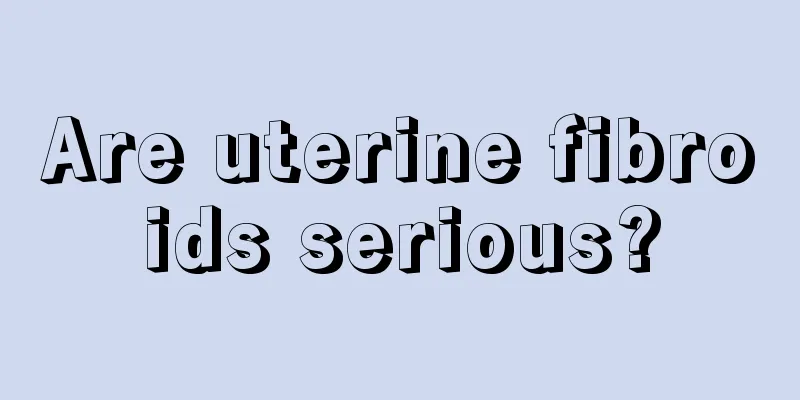Are uterine fibroids serious?

|
Are uterine fibroids serious? For ordinary people, they are particularly afraid when they hear about diseases related to tumors. In fact, uterine fibroids are not cancer, but a common gynecological tumor. As long as the correct treatment method is chosen, it can be cured quickly. There are many treatments for uterine fibroids, the most common of which are medication, myomectomy, and hysterectomy. The specific method to be used should be determined based on the patient's specific situation. Can uterine fibroids be cured? Uterine fibroids are the most common and mildest benign tumor among gynecological tumors. Many women have been troubled by it in life, but as long as active treatment is carried out and postoperative protective measures are taken, the disease can be completely cured. The following is a detailed introduction to the cure for uterine fibroids. 1. Drug treatment: Currently, the gonadotropin-releasing hormone agonists commonly used in clinical practice include leuprorelin, goserelin, triptorelin, etc. Gonadotropin-releasing hormone agonists should not be used continuously for a long time. They are only used for pretreatment before surgery, generally for 3 to 6 months, to avoid causing severe menopausal symptoms caused by low estrogen. Small doses of estrogen can also be supplemented at the same time to counteract this side effect. Mifepristone is a progesterone antagonist that has been clinically tried in recent years to treat uterine fibroids. It can reduce the size of fibroids, but the fibroids often grow again after discontinuation of the drug. Tamoxifen can inhibit the growth of fibroids. However, long-term use may cause enlargement of uterine fibroids in some patients, and may even induce endometriosis and endometrial cancer, so this should be paid attention to. 2. Surgical treatment: Surgical treatment of uterine fibroids includes myomectomy and hysterectomy, which can be performed abdominally or vaginally, or endoscopic surgery (hysteroscopy or laparoscopy) can be performed. The choice of surgical procedure and approach depends on factors such as the patient's age, whether or not they have fertility requirements, the size and location of the fibroids, and medical technology conditions. (1) Myomectomy: A surgery to remove uterine fibroids while preserving the uterus. It is mainly used for young women under 40 years old who wish to retain their fertility. It is suitable for patients with larger fibroids, heavy menstruation, compression symptoms, infertility due to fibroids, submucosal fibroids, and fast-growing fibroids without malignant transformation. (2) Hysterectomy: For patients with obvious symptoms, those with the possibility of malignant transformation of fibroids, and those who have no desire to have children, hysterectomy is recommended. Hysterectomy can be performed with total hysterectomy or subtotal hysterectomy. For older women, total hysterectomy is more appropriate. The possibility of cervical malignancy must be excluded before surgery. Although uterine fibroids are a common benign tumor, the harm they cause cannot be ignored, especially for women of childbearing age. They must actively seek treatment because the disease can cause infertility or habitual abortion. Long-term menorrhagia or irregular vaginal bleeding can cause hemorrhagic anemia, which seriously threatens the patient's health. Therefore, active treatment is urgent. |
<<: How do uterine fibroids form?
>>: Treatment of uterine fibroids in pregnant women
Recommend
Which kind of female tools is better?
As society develops, people's material condit...
How to tell if steamed fish is cooked How to tell if steamed fish is cooked
We all know that there are many ways to eat fish,...
What does nonspecific vaginitis mean?
The characteristic of nonspecific vaginitis is th...
Why do women sweat on the soles of their feet?
Sweating is not a strange thing, everyone sweats,...
Letrozole tablets for successful pregnancy
Some female friends have made a lot of efforts to...
What causes abdominal pain in early pregnancy?
In many cases, there are many issues that pregnan...
Does laser hair removal affect pregnancy?
Laser hair removal is very effective and can quic...
If a woman often comes into contact with this liquid, her life will be ruined
There is an advertising slogan that goes like thi...
Why don't women have hair down there?
As humans age, their bodies are constantly changi...
Is nipple pain normal during ovulation?
It is normal to experience nipple pain during ovu...
What medicine should I take to treat premature amenorrhea?
If a woman experiences premature menopause, she c...
What are the main hills in my country? How are hills formed?
Hills generally have no obvious veins and are rou...
Side effects of early pregnancy medical abortion
What do you think about this early pregnancy drug...
What is the posterior wall of the placenta?
Nowadays, many women want to know what the poster...









